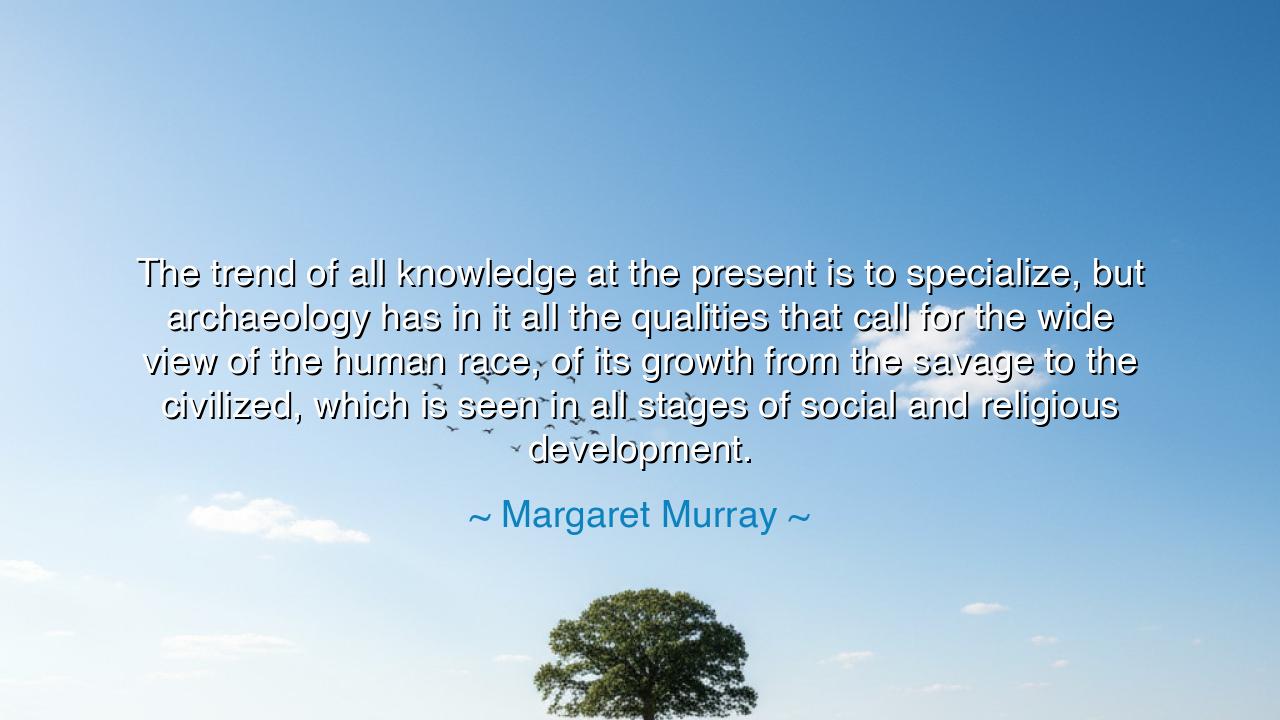
The trend of all knowledge at the present is to specialize, but
The trend of all knowledge at the present is to specialize, but archaeology has in it all the qualities that call for the wide view of the human race, of its growth from the savage to the civilized, which is seen in all stages of social and religious development.






Margaret Murray, a pioneer in her field and a voice both bold and wise, once said: “The trend of all knowledge at the present is to specialize, but archaeology has in it all the qualities that call for the wide view of the human race, of its growth from the savage to the civilized, which is seen in all stages of social and religious development.” In this declaration she draws a contrast between the narrowing gaze of modern scholarship and the broad, unifying vision that archaeology demands. For while other fields cut reality into fragments, archaeology holds the long thread of humanity’s story, binding us to the lives of our ancestors and reminding us of the unity of our journey.
The meaning of her words is as expansive as the earth itself. In her day, scholars were driven to divide disciplines into ever-smaller chambers—specialists of languages, specialists of bones, specialists of rituals, each working in their narrow corners. Yet Murray declares that archaeology cannot be confined in this way. It compels us to see broadly, to look at the human race as a whole, spanning centuries and continents, tracing our rise from crude beginnings into the heights of culture and belief. It is not only about shards of pottery or stones in the ground, but about the vast sweep of human growth—how men and women hunted, prayed, built, dreamed, and changed.
The origin of her insight lay in her own life’s work. Margaret Murray was one of the first women to achieve prominence in archaeology, and she devoted herself to uncovering both artifacts and their human meaning. She was not content with mere technical detail; she sought to understand the spirit of the peoples she studied. To her, archaeology was not only about uncovering ruins, but about uncovering humanity itself, a discipline that demanded a wide view because it was the study of the entire human journey.
History offers us powerful testimony to her vision. When Schliemann uncovered the ruins of Troy, it was not only a triumph of stones unearthed, but a revelation that myths and epics had roots in the lived history of men. The discovery showed us that the human race has always woven stories and faith into its survival, and that those threads connect the so-called “savage” to the “civilized.” Or when Howard Carter opened the tomb of Tutankhamun, the treasures revealed not only the opulence of Egypt but also the religious fervor, the artistry, and the human longing for immortality that has burned in every age. These were not discoveries for specialists alone—they spoke to the whole of mankind.
Even the simplest excavation speaks this truth. A child’s toy carved in clay, found buried beneath centuries of dust, tells us that joy, play, and family life are as ancient as hunger and war. The patterns of burial and worship found in forgotten villages tell us that the search for meaning, the reverence for the divine, has been with us since we first gathered around fire. To study archaeology is to take the wide view—to see ourselves as a species bound together, not by fragments of specialization, but by a continuous story of striving, suffering, and transcending.
The lesson here is both humbling and ennobling. Knowledge has its place in specialization, but we must not let it blind us to the whole. It is dangerous for humanity to see itself only in fragments—economics without ethics, technology without wisdom, politics without history. Archaeology reminds us to take the wide view, to see ourselves not only as individuals but as part of a great river of time, flowing from the first villages to the cities of today. Without that wide view, we risk forgetting who we are and where we came from.
So what must you do? Honor specialization, but do not be enslaved by it. Seek the wide view in your learning, in your work, and in your life. Remember that your struggles are not new—they echo those of ancestors long gone. Let the relics of the past, whether read in books or seen in museums, remind you of the shared humanity that transcends borders and ages. Live as though you are both a child of today and a keeper of yesterday, charged to pass on wisdom to tomorrow.
Thus, carry Murray’s wisdom: “The trend of all knowledge is to specialize, but archaeology … calls for the wide view of the human race, of its growth from the savage to the civilized.” Let it shape your vision, so that in all your learning you never lose sight of the greater whole. For the fragments of fact may dazzle, but it is the wide view that gives meaning, and in that meaning lies the greatness of humanity’s story.






AAdministratorAdministrator
Welcome, honored guests. Please leave a comment, we will respond soon